Direct entry MSN programs without GRE requirements give you the opportunity to enter the nursing profession if you have an undergraduate degree in a different field.

Direct entry nursing programs can help you break into the rewarding field of nursing, even if your previous education and experience have been focused on different professional avenues.
Editorial Listing ShortCode:
Whether your background is in business, arts, education, or another field, graduate entry nursing programs can help you redirect your career path. Holding an MSN can also be a qualification for obtaining an advanced practice nursing license, depending on your specialization.
Universities Offering Direct Entry MSN Degree Programs Without GRE Requirements
Methodology: The following school list is in alphabetical order. To be included, a college or university must be regionally accredited and offer degree programs online or in a hybrid format. In addition, the universities either do not require GRE test scores as part of the admission requirements or offer GRE waivers for qualified students.
Columbia University
Columbia University offers a Master of Science degree for students who have chosen to take the Masters Direct Entry program. Each course in the program focuses on nursing, allowing students to receive a degree in nursing. Applicants must have an average grade of B or higher.
Columbia is accredited by the Middle States Commission on Higher Education.
Marquette University
Marquette University offers a Direct Entry Master of Science in Nursing program. To graduate, students must maintain a GPA of 3.0 or higher. Classes can be completed online or on campus. Only students without a background in nursing are eligible for the program. GRE scores are not required to apply.
Marquette University is accredited by the Higher Learning Commission.
MGH Institute of Health Professions
The MGH Institute of Health Professions offers a Direct Entry Master of Science in Nursing program. Students may add one of 7 concentrations to their degree. The program can typically be completed in 3 years. Applicants must submit 2 letters of reference and a personal statement and have a GPA of 2.7 or higher.
MGH Institute of Health Professions is accredited by the New England Commission of Higher Education.
Northeastern University
Northeastern University offers a Direct Entry Master of Science in Nursing. The program helps students with undergraduate degrees in unrelated fields to obtain a Bachelor of Science in Nursing, become registered nurses, and obtain a Master of Science in Nursing. Applicants must submit 3 letters of recommendation and have a GPA of 3.0 or higher.
Northeastern University is accredited by the New England Commission of Higher Education, Inc.
Rush University
Rush University offers a Master of Science in Nursing for students who do not currently have a degree in nursing. To graduate, students must complete 74 semester hours, including a clinical practicum. Applicants with a GPA of 3.0 or higher do not need to submit GRE scores.
Rush University is accredited by the Higher Learning Commission.
Sacred Heart University
Sacred Heart University offers a Master of Science in Nursing. A specialization may be added to the degree if the student is willing to complete both a capstone project and a practicum. Applicants must have a bachelor’s degree with a GPA of 3.0 or higher, a statement of professional goals, and 2 letters of recommendation.
Sacred Heart University is accredited by the New England Commission of Higher Education.
Simmons University
Simmons University offers a Direct Entry program for students interested in obtaining a Master of Science in Nursing. The program can usually be completed in 4 years and requires students to complete 96 credits. Applicants must have a minimum GPA of 3.0, 3 letters of recommendation, and a personal statement.
Simmons University is accredited by the New England Commission of Higher Education.
University of Pennsylvania
The University of Pennsylvania offers students a Direct Entry Bachelor of Science in Nursing to Master of Science in Nursing program.
Students in the program are allowed to take courses at a time that best fits their schedule as long as the required credits are obtained in 5 years. Applicants must have 2 letters of recommendation and complete a video interview.
The University of Pennsylvania is accredited by the Middle States Commission on Higher Education.
Vanderbilt University
Vanderbilt University offers a Pre-Specialty Entry for students interested in receiving a Master of Science in Nursing that don’t have a bachelor’s degree in a related field. Students in this program add 3 semesters onto the program to obtain the nursing credits required. Applicants must meet the required prerequisite courses listed on their website.
Vanderbilt University is accredited by the Southern Association of Colleges and Schools Commission on Colleges.
Viterbo University
Viterbo University offers a Direct Entry Master of Science in Nursing program. Classes are offered online with in-person clinics and labs. The program can typically be completed in 5 semesters. Applicants must have a bachelor’s degree with a GPA of 3.0 or higher, CPR training, and up-to-date immunizations.
Viterbo University is accredited by the Higher Learning Commission.
Direct Entry MSN Programs Without GRE
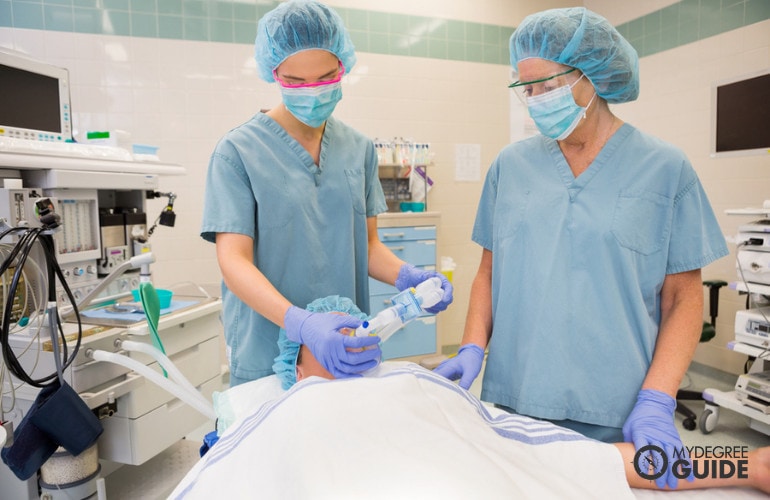
Direct entry MSN no GRE programs are intended to provide you with both a bachelors-level and masters-level education within a single program offering.
By design, direct-entry MSN program options are meant for students who hold a bachelor’s degree in a field other than nursing. As a result, direct entry nursing programs first cover bachelor-level coursework and prepare you to earn your registered nursing (RN) license.
Also, if you are looking to combine your nursing skills with business principles, you may be interested in the dual MSN / MBA program options that some universities offer. Once you’ve earned your RN license, the program goes on to masters-level coursework, preparing you for advanced practice registered nursing positions.
Depending on their licensed specialty, a professional with an MSN may work as a:
- Registered nurse
- Nurse practitioner
- Nurse midwife
- Nurse anesthetist
- Critical care nurse
- Public health nurse
- Clinical nurse specialist
Coursework can range across bachelor and master’s-level education, and your course topics may include:
- Nursing interventions
- Clinical nursing for women and families
- Health informatics
- Pharmacology
- Wellness across the lifespan
- Palliative care
- Evidence-based practice
- Pediatric nursing
- Foundations of healthcare quality
In addition to completing a variety of coursework, you may also be required to complete a specific number of clinical placement hours in order to graduate with your degree.
Nursing Careers & Salaries
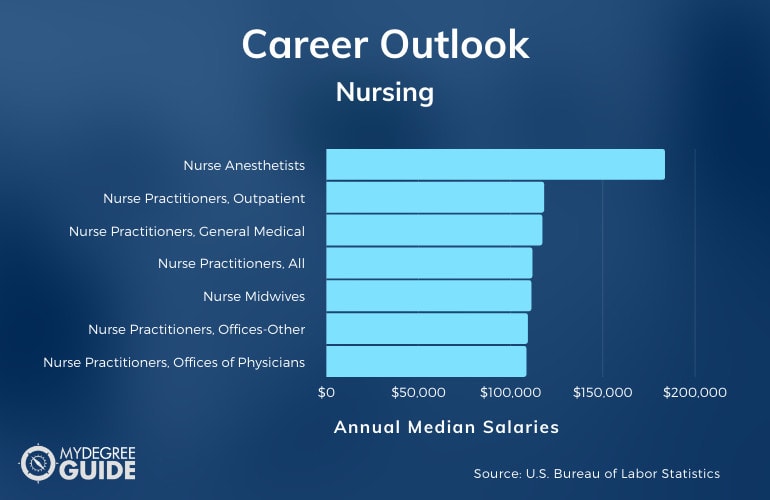
While it is common to think of nurses as working within a hospital setting, there are a number of other workplaces and industries that may require nursing expertise. These can include outpatient health centers, physician offices, nonprofit agencies, and residential care facilities.
According to the Bureau of Labor Statistics, direct admit nursing programs can help you qualify for licensure as well as a variety of opportunities in the field of nursing, depending on your specialization.
| Careers | Annual Median Salaries |
| Nurse Anesthetists | $183,580 |
| Nurse Practitioners, Outpatient Care Centers | $118,020 |
| Nurse Practitioners, General Medical and Surgical Hospitals | $117,080 |
| Nurse Practitioners, All | $111,680 |
| Nurse Midwives | $111,130 |
| Nurse Practitioners, Offices of Other Health Practitioners | $109,200 |
| Nurse Practitioners, Offices of Physicians | $108,430 |
| Medical and Health Services Managers | $104,280 |
| Registered Nurses | $75,330 |
| Nursing Instructors, Junior Colleges | $67,980 |
A number of positions in the field of nursing are predicted to experience significant job growth over the next several years (Bureau of Labor Statistics). These positions include registered nurses (7% job growth), nurse midwives (12%), nurse anesthetists (14%), medical and health services managers (32%), and nurse practitioners (52%).
How to Choose an Online Direct Entry MSN Program
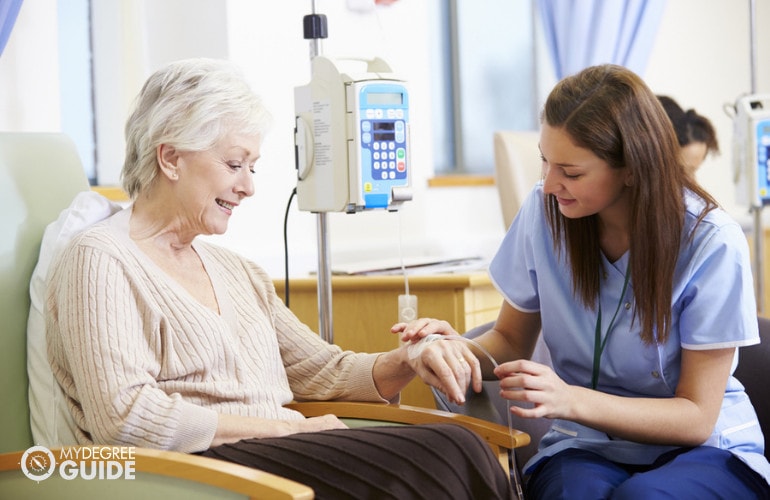
When pursuing direct entry MSN programs for non nursing majors online, there are a number of factors to consider, including:
- Credit amount. Different programs can involve a different number of credits required to graduate.
- Admission requirements. Admission requirements can vary, so you may want to find out the specific admissions criteria for the program you’re interested in attending.
- Available concentrations. The curriculum and concentrations offered will vary by program.
- Required clinical hours. Each program specifies the number of clinical hours required and any specifications regarding how you must earn those hours, such as nursing areas.
- Accreditation status. It’s beneficial to know if the program you’re interested in has regional and professional accreditation status. This may determine if it is in line with requirements for RN licensure and advanced care licenses.
- Program options. Programs can have different learning options and attendance structures available, including online versus in-person formats and full-time or part-time options.
Another factor that you may want to consider is the pass and fail rate of former students who took the NCLEX examination.
Direct-Entry MSN Curriculum & Courses

Accelerated nursing program options may require you to complete a bachelor-level nursing education before moving on to master-level coursework.
Courses that you’ll complete as part of your direct entry MSN program may include:
- Legal and Ethical Accountability in Professional Nursing Practice: You’ll learn about various ethical and legal considerations in the field of nursing, including nursing liability.
- Enhancement of Community and Population Health: You’ll develop an understanding of principles and best practices related to public and community-based healthcare.
- Pharmacology for Nursing Care: You’ll learn the role of nursing in drug treatment and therapy while developing a foundational knowledge of pharmacological practices.
- Fundamentals of Clinical Practice in Nursing: You’ll learn about practical nursing applications, including patient assessment, planning of care, healthcare intervention, and delivery of care.
- Leadership and Management in Nursing Practice: You’ll review key concepts related to leadership and management in the field of nursing, including team building, decision-making, and conflict management.
- Individual Psychotherapy: This course covers key theories related to psychotherapy practices in the nursing profession.
- Basic Principles of Anesthesia: This course covers the basic practices, techniques, and responsibilities related to the use of anesthesia.
- High-Risk Childbearing Family: You’ll learn about evidence-based practices related to family nursing practice in midwifery care for families dealing with high-risk pregnancies.
- Management of Episodic and Chronic Health Problems: You’ll learn about managing episodic and chronic health issues in acute care settings.
- Pediatric Health Theory: This course reviews key theories related to pediatric healthcare.
Bachelor-level course work is more general in nature. Once you’ve moved on to masters-level education, you may have the opportunity to specialize and select from a number of different educational concentrations.
As a result, the courses throughout the masters program portion of your learning can vary greatly depending on the specialty you choose to pursue.
Admissions Requirements

The admission requirements for direct entry MSN programs, whether online or on-campus, may vary from one program to the next, but some common requirements include:
- Undergraduate degree in any field
- Statement of intent
- Letters of recommendation (only required by some schools)
- Prerequisite courses (if required)
- Submission of your resume or CV
It’s worth noting that while GRE or GMAT testing scores may be a requirement for some programs, there are a number of direct entry MSN programs that do not require GRE scores.
Accreditation
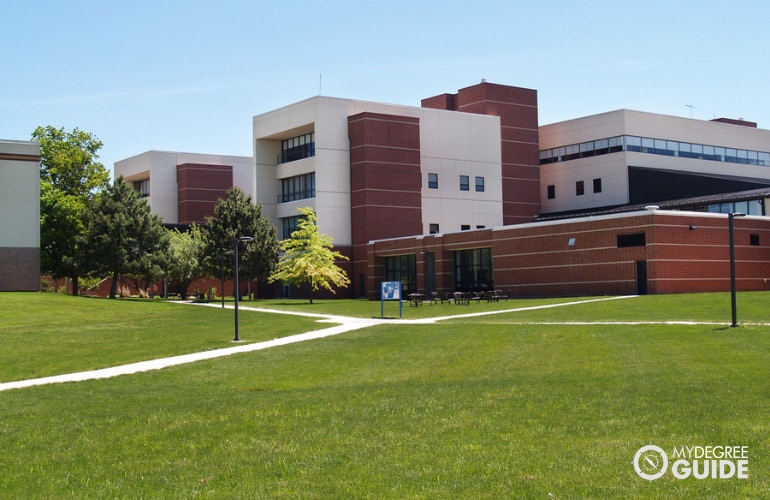
Regional accreditation is a status given to schools that have met a predetermined set of quality standards for their educational offerings.
Earning your degree from a regionally accredited institution is an important consideration. This status can influence your ability to transfer credits and enroll in PhD level programs. It can also impact hiring decisions of potential employers.
In some cases, the accreditation status of the program you attend can also influence your ability to obtain licensure. For more information on the accreditation status of the program you’re interested in attending, you can visit the US Department of Education’s website.
Advanced Practice Nursing Certifications

After graduating from a direct entry MSN program, you may decide to pursue a career as a registered nurse (RN) or an advanced practice registered nurse (APRN). APRNs require a masters degree and special certification. APRN roles include nurse practitioner, nurse midwife, nurse anesthetist, and clinical nurse specialist.
Here are some examples of APRN certifications that you may go on to earn, depending on your MSN specialization:
- Family Nurse Practitioner
- Adult-Gerontology Clinical Nurse Specialist
- Oncology Nurse Practitioner
- Psychiatric Mental Health Nurse Practitioner
- Certified Nurse Midwife
The advanced practice nursing certification that’s right for you can depend on your educational background and professional goals.
Financial Aid and Scholarships
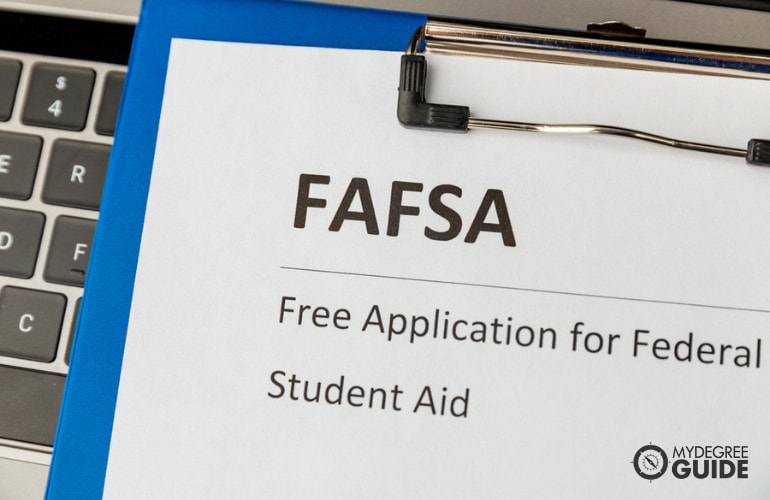
Pursuing a direct entry MSN educational program can be more cost-effective than completing a BSN and MSN separately. A number of financial aid options are also available to qualifying students to help cover tuition costs. These options may include:
- Grants and loans offered by federal and state governments
- Scholarships made available by public and private organizations
- Employer training or professional development programs
- Government-run work-study programs
For more information on financial aid options, you can visit the Free Application for Federal Student Aid (FAFSA) on the US Department of Education’s website.
Can I Get an MSN Without a BSN?

Yes, it is possible to earn a Master of Science in Nursing without a Bachelor of Science in Nursing. There are a number of direct-entry options available that allow you to enroll in MSN programs without BSN credentials. So, you are able to enroll in direct entry MSN programs with a bachelor’s degree obtained in a field other than nursing.
As part of this direct entry track, you would complete a variety of bachelor-level nursing education prior to moving on to master’s-level coursework.
Are There Online MSN Programs That Do Not Require GRE?

Yes, there are online MSN programs that do not require you to submit Graduate Record Examination (GRE) scores for enrollment.
Submitting GRE scores may still be required for some programs, but there are a number of direct entry masters in nursing programs that do not have this requirement. You can research each school you’re interested in applying to in order to verify the specific admissions requirements for their MSN program.
Is a Direct Entry Master’s in Nursing Right for Me?

Deciding on whether or not a direct entry master’s in nursing program is right for you may depend on a number of factors, including your personal goals and circumstances.
Here are some factors to consider:
- No prior nursing experience. A direct entry MSN program allows you to enroll without having any previous nursing education or experience.
- Promising job outlook. Advanced practice nursing careers generally have promising outlooks and higher than average annual salaries.
- Career advancement. A direct entry masters in nursing can qualify you for advanced positions in the nursing field, allowing you to benefit from faster than average career advancement.
Another key consideration is whether the profession of nursing is in line with your career-related interests and goals.
What Are the Advantages of a Direct-Entry MSN Program?
Here are a number of advantages to pursuing a direct entry MSN program:
- Less time to complete. Direct-entry MSN programs allow you to earn your masters degree in less time than the traditional route of completing a BSN followed by an MSN program.
- No prior experience needed. You can enter a direct-entry MSN program with non-nursing undergraduate education.
- Can advance more quickly. With a direct-entry MSN, you can qualify for registered nursing licensure and advanced practice nursing certifications in less time than with the traditional route.
Depending on the program you choose to attend, you may also be able to benefit from lower costs when compared to the option of completing each degree separately.
What’s the Difference Between an Accelerated BSN vs. Direct Entry MSN?
Both accelerated BSN and direct entry MSN programs are centered around the field of nursing. They have a number of differences, though, in terms of education type, degree earned, and level of expertise and qualification.
| Accelerated BSN | Direct Entry MSN |
|
|
An accelerated BSN may be followed by a standard MSN program. If you’re interested in accelerated MSN programs, a number of schools also offer accelerated BSN to MSN programs.
If you need a program that may better fit with your work schedule, it may be worth looking into the online accelerated nursing degree programs that some universities offer.
What’s the Difference Between a Nursing Bridge Program vs. Direct Entry MSN?
Both nursing bridge programs and direct entry MSN programs are designed to provide nursing education, but they target different types of individuals.
| Nursing Bridge Programs | Direct Entry MSN Programs |
|
|
The fundamental difference between the two program types is the level of education that students have in the field of nursing prior to entering into the program. Some universities also offer accelerated BSN programs with high acceptance rates.
Is a Direct Entry MSN Worth It?
Yes, a direct entry MSN is worth it for many students. By pursuing a direct entry MSN program, you may be able to earn your Master of Science in Nursing in less time and at a lower cost than if you were to pursue a BSN and MSN separately.
The Bureau of Labor Statistics projects significant job growth for a number of advanced nursing positions over the next ten years. These positions include registered nurses (7% job growth), nurse midwives (12%), nurse anesthetists (14%), and nurse practitioners (52%).
Getting Your Direct Entry MSN Degree Online

If you want to pursue a career in nursing but have an educational and professional background in a non-nursing area, then enrolling in a direct entry MSN program may be the degree track for you.
A direct entry MSN program is a strategic way to complete bachelor- and master-level education within a single program. A masters in nursing can prepare you to pursue licensure as a registered nurse as well as specialized certification as an advanced practice registered nurse.
If you’re ready to enter this quickly growing field, you can start your educational journey by exploring online direct entry MSN degrees from accredited schools.
